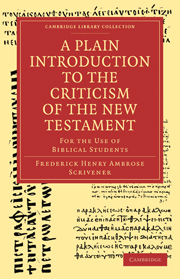Book contents
- Frontmatter
- ADVERTISEMENT
- ADDENDA ET CORRIGENDA
- Contents
- CHAPTER I PRELIMINARY CONSIDERATIONS
- CHAPTER II ON THE GREEK MANUSCRIPTS OF THE NEW TESTAMENT
- CHAPTER III ON THE ANCIENT VERSIONS OF THE NEW TESTAMENT IN VARIOUS LANGUAGES
- CHAPTER IV ON THE CITATIONS FROM THE GREEK NEW TESTAMENT MADE BY EARLY ECCLESIASTICAL WRITERS
- CHAPTER V ON THE EARLY PRINTED, AND LATER CRITICAL EDITIONS OF THE GREEK NEW TESTAMENT
- CHAPTER VI ON THE LAWS OF INTERNAL EVIDENCE, AND THE LIMITS OF THEIR LEGITIMATE USE
- CHAPTER VII ON THE HISTORY OF THE TEXT, INCLUDING A DISCUSSION OF RECENT VIEWS OF COMPARATIVE CRITICISM
- CHAPTER VIII ON THE PECULIAR CHARACTER AND GRAMMATICAL FORM OF THE DIALECT OF THE NEW TESTAMENT
- CHAPTER IX APPLICATION OF THE FOREGOING MATERIALS AND PRINCIPLES TO THE CRITICISM OF SELECT PASSAGES OF THE N. T.
- INDEX I
- INDEX II
- INDEX III
- Plate section
CHAPTER IX - APPLICATION OF THE FOREGOING MATERIALS AND PRINCIPLES TO THE CRITICISM OF SELECT PASSAGES OF THE N. T.
Published online by Cambridge University Press: 05 August 2011
- Frontmatter
- ADVERTISEMENT
- ADDENDA ET CORRIGENDA
- Contents
- CHAPTER I PRELIMINARY CONSIDERATIONS
- CHAPTER II ON THE GREEK MANUSCRIPTS OF THE NEW TESTAMENT
- CHAPTER III ON THE ANCIENT VERSIONS OF THE NEW TESTAMENT IN VARIOUS LANGUAGES
- CHAPTER IV ON THE CITATIONS FROM THE GREEK NEW TESTAMENT MADE BY EARLY ECCLESIASTICAL WRITERS
- CHAPTER V ON THE EARLY PRINTED, AND LATER CRITICAL EDITIONS OF THE GREEK NEW TESTAMENT
- CHAPTER VI ON THE LAWS OF INTERNAL EVIDENCE, AND THE LIMITS OF THEIR LEGITIMATE USE
- CHAPTER VII ON THE HISTORY OF THE TEXT, INCLUDING A DISCUSSION OF RECENT VIEWS OF COMPARATIVE CRITICISM
- CHAPTER VIII ON THE PECULIAR CHARACTER AND GRAMMATICAL FORM OF THE DIALECT OF THE NEW TESTAMENT
- CHAPTER IX APPLICATION OF THE FOREGOING MATERIALS AND PRINCIPLES TO THE CRITICISM OF SELECT PASSAGES OF THE N. T.
- INDEX I
- INDEX II
- INDEX III
- Plate section
Summary
IN applying to the revision of the sacred text the diplomatic materials and critical principles it has been the purpose of the preceding pages to describe; we have selected the few passages we have room to examine, chiefly in consideration of their actual importance, occasionally also with the design of illustrating by pertinent examples the canons of internal evidence and the laws of Comparative Criticism. It will be convenient to discuss these passages in the order they occupy in the volume of the New Testament: that which stands first affords a conspicuous instance of undue and misplaced subjectivity on the part of Tischendorf and Tregelles.
(1) Matth. i. 18. Toû δ έ 'Iη σiov Xpiσroû … is altered by these editors into Toû δ έ 'Iη σiov Xpiσroû, 'I η σov being omitted. Michaelis had objected to the term TOV 'Irjaovv 'XpLcrrop, Act. viii. 37 (see the verse examined below), on the ground that “In the time of the Apostles the word Christ was never used as the Proper Name of a Person, but as an epithet expressive of the ministry of Jesus;” and although Bp. Middleton has abundantly proved his statement incorrect [Doctrine of the Greek Article, note on Mark ix. 41), and 'Icroo Xpiaros, especially in some one of the oblique cases after prepositions, is very common, yet the precise form Toû δ έ 'Iη σiov Xpiσroû occurs only in these places and in 1 John iv. 3; Apoc. xii. 17, where again the reading is unsettled.
Information
- Type
- Chapter
- Information
- A Plain Introduction to the Criticism of the New TestamentFor the Use of Biblical Students, pp. 419 - 464Publisher: Cambridge University PressPrint publication year: 2010First published in: 1861
